Keystone XL
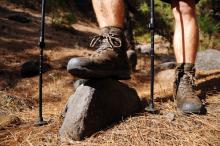
During the week leading up to the “Summer Heat” demonstrations — protesting the Keystone XL pipeline and urging for action on climate change — about 25 people started a hike from Camp David to Washington, D.C. Midway through the 100-mile hike, they were joined by another 50 people at Harper’s Ferry, W.Va. They called their journey the “Walk for Our Grandchildren.”
The name gives away the motivation — the walker’s sense of duty to future generations to leave a healthy planet. When they reached DC, many were arrested in an act of civil disobedience at the offices of Environmental Resources Management, a consulting firm given the task of writing the environmental review of the Keystone XL pipeline — a firm which also works for TransCanada, the energy company seeking to build the pipeline. Many others spent that Friday night at a church, and joined the Summer Heat demonstrations at the White House the next day.

In his letter to the Romans, the apostle Paul writes: “I consider that the sufferings of this present time are not worth comparing with the glory about to be revealed to us. For the creation waits with eager longing for the revealing of the children of God …” (Romans 8:18-19)
And who are God’s children in the immediate context? Paul explains the “children of God” are those whose spirits cry “father” when referring to God. “For,” according to Paul, “all who are led by the Spirit of God are children of God.” (Romans 8:14) If this is true, then why is creation longing for the children of God (those led by God’s Spirit) to be revealed?
In Genesis 1, the author writes, “God saw everything that he had made, and indeed, it was very good.” The Hebrew words for “very good” are mehode tobe. Mehode means “forcefully” and in the Hebrew context tobedoes not necessarily refer to the object itself. Rather it refers to the ties between things. So, when God looked around at the end of the sixth day and said, “This is very good,” God was saying the relationships between all parts of creation were “forcefully good.” The relationship between humanity and God, men and women, within families, between us and the systems that govern us, and the relationship between humanity and the rest of creation — the land, the sea, and sky and all the animals and vegetation God created to dwell in those domains—all of these relationships were forcefully good!
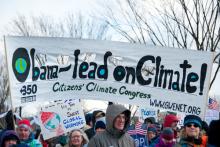
Yesterday was a momentous day for the creation care movement: after years of inaction from Congress, President Obama announced a major, comprehensive plan of action on climate change. President Obama’s new “Climate Action Plan,” which he laid out in a speech at Georgetown University Tuesday, addresses the country’s largest source of climate pollution — carbon dioxide from power plants — as well as boosting energy efficiency standards, renewable energy production on public lands, and resilience for cities, towns and roads.
When the ExxonMobil Pegasus pipeline split open in late March it spilled 210,000 gallons of oil into a small Arkansas town. The spill galvanized opponents of the Keystone XL Pipeline, who cited its planned path through major rivers and aquifers. Activists say TransCanada, which would build and operate the pipeline, underestimate the size of potential spills.
"I don't agree with people who say a spill into the aquifer will ruin the whole aquifer. It would ruin a very small piece, but it's important if that's your small piece," John Stansbury, a University of Nebraska professor of environmental and water resources engineering. "But if it got into a major river, it could create a plume hundreds of miles long."
Read more here.
Climate defenders should celebrate the news that Obama is continuing to delay signing a permit that would allow foreign-owned mining company TransCanada a permit to build the northern route of the highly controversial Keystone XL pipeline across the U.S.
After the State Department once again released a highly flawed assessment in March and the Environmental Protection Agency called it “deeply flawed” (again), we see that grassroots pressure is creating an effective roadblock on this incredibly dangerous path.
From Reuters:
The Obama administration is unlikely to make a decision on the Canada-to-Nebraska Keystone XL pipeline until late this year as it painstakingly weighs the project’s impact on the environment and on energy security, a U.S. official and analysts said on Friday.
The decision may not be made until November, December or even early 2014, said a U.S. official … who did not want to be named given the sensitive nature of the project.
Analysts agreed that a decision would not be made by this summer as the State Department had suggested when it issued an environmental review on the pipeline on March 1.
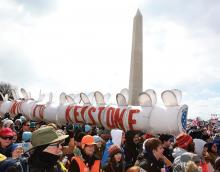
ALL I EVER wanted to see was a movement of people to stop climate change, and now I've seen it. And it looks so beautiful. It's hometown heroes like our friends in D.C. who've been fighting coal plants, and far-flung heroes like those who've been bravely blocking the Keystone XL pipeline with their bodies in Texas. It's people who understand that the fight against fracking and coal ports and taking the tops off mountains is ultimately the fight for a living planet; it's people who have lived through Sandy and survived the drought, some of whom I got to go to jail with recently.
It's the students at 252 colleges who are now fighting the fossil fuel industry head on to force divestment of their school's stock—the biggest student movement in decades. It's all of you—you are the antibodies kicking in, as the planet tries to fight its fever.
We've waited a very long time to get started, I fear. We've already watched the Arctic melt; our colleagues in 191 countries tell us daily of some new drought or flood.
Because we've waited this long, the easiest answers are no longer enough; we're going to have to make tough decisions. Our theme has to be: When you're in a hole, stop digging. Above all stop the Keystone XL pipeline. The president can do it with a single stroke of his pen, and if he does he will become the first world leader to veto a big project because it's bad for the climate. That would be a legacy—and a signal to the rest of the world that we're serious about this fight. It's his test.

When it comes to the Keystone XL pipeline, the oil and gas industry want you to believe that you have to choose between jobs and prairie grass. This tactic is called the “divide and conquer” or “divide and rule” strategy. It’s as old as the empires of ancient Greece and Rome. It still works because human nature hasn’t changed that much.
Two years ago I sat down across the table from Dr. Kerri-Ann Jones, the highest ranking State Department official (short of the Secretary of State) to weigh in on the Keystone XL pipeline permit process. A group of religious leaders were delivering thousands of petitions to Dr. Jones asking her to to stop the pipeline.
I said to her, "If this decision about the pipeline was made purely based on the climate science, we wouldn't be here having this discussion." She’s a scientist. She knows the score. She didn't disagree. “But,” she said, “everywhere we go across the country we hear about the need for jobs – especially in the middle of the country.”
Divide and conquer.
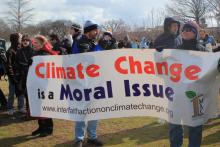
God’s creation is in danger; and to call upon the powers of the world to heal it, God’s people are prepared to go to jail.
Perhaps most famously in our recent history, the startling sight of a religious leader in jail was embodied in the willingness of Dr. Martin Luther King, Jr., to go to jail more than 20 times in order to embody his religious commitment to racial justice, peace, and nonviolence.
As we approach the Holy Week of Christianity and Passover, we should be aware that this tradition goes back thousands of years. The movement of ancient Israelites seeking freedom from a lethal Pharaoh began even before Moses, when two midwives – the Bible carefully records their names, Shifra and Puah – refused to murder the boy-babies of the Israelites as Pharaoh had commanded. The recollection of that moment is the first recorded instance of nonviolent civil disobedience.
When that cruel and arrogant Pharaoh, addicted to his own power, refused freedom to his nation’s slaves, his arrogance forced the Earth itself to arise in what we call the Plagues – ecological disasters like undrinkable water, swarms of frogs and locusts, the climate calamity of unprecedented hailstorms.
Passover has kept alive and lively the memory of that uprising. So it is not surprising that the Gospels record that just before the week of Passover, Jesus led a protest against the behavior of the Roman Empire, its local authorities, and a Temple he and his followers thought had become corrupted from its sacred purpose.
To protest against the Empire of his era, Jesus chose a time that was both appropriate and dangerous, since Passover celebrates the fall of Pharaoh. His challenge resulted in his arrest and imprisonment, and then his torture and execution.
Both Judaism and Christianity can trace their origins to acts of nonviolent civil disobedience. Indeed, for several centuries of Imperial Rome, the very persistence of Rabbinic Judaism and Christianity were collective acts of civil disobedience.
Today, religious folk face modern plagues imposed upon our countries and our planet by a new kind of Pharaoh.
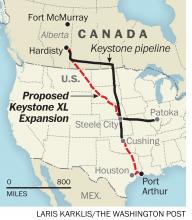
“If we fully develop the tar sands, we will certainly lose control of the climate. We will get to a point where we can not walk back from the cliff,” says climate scientist Dr. John Abraham. The Keystone XL pipeline is the lynchpin to developing the tar sands in Alberta.
I’ve been paying attention to the Keystone pipeline development since 2011 when it was under review by the State Department. I joined a group of religious leaders to deliver thousands of petitions to Dr. Kerri-Ann Jones, Assistant Secretary of State for Oceans and International Environmental and Scientific Affairs, asking her to to stop the pipeline. I said to her, “If this decision about the pipeline was made purely based on the climate science, we wouldn’t be here having this discussion.” She didn’t disagree. The exploitation of tar sands will significantly worsen the climate.
Now, new scientific data shows that developing the tar sands (and the pipeline to carry it) is worse than previously known. The video above shows climate scientists countering the notion that the climate impacts of the Keystone XL pipeline are small compared to total U.S. global greenhouse gas emissions. Nathan Lemphers, a Senior Policy Analyst with the Pembina Institute, details how the Keystone XL is a critical ingredient to significant expansion of tar sands. He dispels the myth being promoted by the tar sands oil industry that tar sands development is inevitable with our without Keystone XL. That’s not true. All other routes are similarly being blocked.
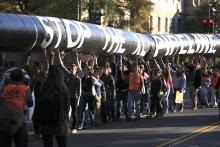
Last week, 56 senators voted to include the Keystone XL Pipeline in a highway bill — four short of the required 60.
The vote proved that ordinary people still can make a difference. Months of action, hundreds of thousands of messages and phone calls, and stalwart determination made the difference in those four votes. And I think it shows that people are looking for a different paradigm of environmental stewardship.

Having critics isn’t a bad thing. Sometimes they serve as a sort of public accountability. Other times, they express questions that others might be asking but haven’t voiced.
Marvin Olasky, editor in chief of World Magazine, came out with a quick critique of Sojourners’ press release celebrating the Obama Administration’s decision to reject the current plans for building the Keystone XL pipeline. His post offers an excellent opportunity to address a few things that others might have been wondering as well.
His headline? “Sojourners and Keystone: Using the Bible for Political Purposes.”
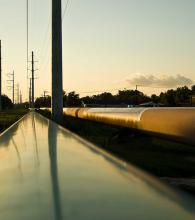
Late Wedesday (1/18), leaders from Christian and other faith communities welcomed the news that the Obama administration has rejected the construction of the Keystone XL pipeline.
The controversial project, which would have run for 1,700 miles from Alberta, Canada, through the American Heartland to the Gulf of Mexico, would have been a backward step in the administration’s professed commitment to investing in clean and renewable energy sources.
In August 2011, more than 1,200 peaceful protestors were arrested as part of a sustained campaign to demonstrate against the pipeline project. In November 2011, Sojourners CEO Jim Wallis, along with other Sojourners staffers and 15,000 members of the public, peacefully (and prayerfully) encircled the White House to urge President Obama to stop the project.
Sojourners welcomed the Obama’s decision in November to postpone the permitting of the pipeline until an environmental impact report was completed. While this new decision is a clear step forward, TransCanada has the opportunity to reapply for the permit along a different route and leaders have pledged to remain vigilant and watch the issue closely.
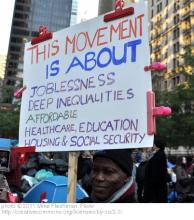
I was also struck by their refusal to simply announce a set of demands. Occupiers aren’t dumb—they’ve read and heard the many calls from the media and politicians that they simply say what they want. It would be easy enough—but in some sense it would detract from the greatest usefulness of the campaign, which has been to articulate a sense of despair bordering on rage. Because they didn’t quickly say “we want this bill passed,” commentators have had to grapple with the actual message of many Occupiers: Our economy is unfair. It gives too much power to corporations who abuse that power for their own ends. They’ve not just cheated us financially; they’ve cheated us of our democracy.

A (usually) twice-daily round up of news related to Sojourners commitments to social justice and the poor.
Organized Labor Will Continue Standing With Evicted Protesters. Sentamu Hits Out At Greed Culture Of Fat Cats. Does Immigration Fuel Crime? Without Statistical Consensus, Rhetoric And Fear Reign In Debate. Occupying History. Faith Plays Role In Occupy Wall Street Sense Of Morality. Immigrants And English Acquisition. People Reject National Banks, Want To Go Local. OpEd: On the Rise in Alabama. Why the Religious Right Can’t Seem to Get the Candidate It Wants. A New Battle For Religious Freedom? Keystone XL Is Delayed — So Where's The Oil Going Now? OpEd: Is Rick Perry’s Zero Foreign Aid Plan Feasible? Desirable?
U.S. Bishops Should Focus On Economy, On Deficit Reduction; The Public Has Spoken: Tax Hikes On Rich, No Cuts To Medicare; My Foreign Aid Budget Starts At Zero; John McCain 'Very Disappointed' By GOP Candidates' Endorsement Of Waterboarding; Keystone XL: Despite Delay, Oil's Grip Remains Strong; Latino Evangelicals Challenge Alabama Brethren On Immigration; Mariann Budde, Diocese Of Washington’s Next Top Bishop, Has Plans For Reviving The Episcopal Church.

It didn’t take long — after news broke this afternoon that President Obama had indefinitely kyboshed the climate-killer Keystone XL pipeline — for my phone to ring.
“Hi Rose, I’m calling from White House on behalf of President Obama," the voice on the other end of the line said. "We wanted to makes sure you’d seen the president’s executive order postponing the permitting of the pipeline until another environmental impact report can be done, especially focusing on sensitive environmental issues in Nebraska.
"And we want to thank you for your good work on this issue. We’re just reaching out to let you know that the President hears you and we hope you’ll continue to help us focus on the really critical issues that are facing us right now.”
This afternoon President Obama made an official announcement on the Keystone XL Pipeline that so many of you have been working on these last several months.
President’s Obama’s delay in approving the Keystone XL Pipeline is a victory for the movement to stop it, for God’s earth, for the possibility of reversing climate change, and for saving the integrity of this administration.
A “No” to pipeline approval wasn’t really politically likely, with the likelihood of attacks on Obama by the Republicans and the labor movement of sacrificing jobs during an election year — even though the pipeline offers temporary and bad jobs.
The environmental movement is part of the Democratic President’s base, but so is labor and they are both more numerous and more effectively organized to help in presidential races.
So this delay is a victory for the possible future of a clean energy economy, which would produce many more and better jobs, while making a cleaner and more sustainable economy possible.
In a statement released by the White House this afternoon, President Obama said in part:
Because this permit decision could affect the health and safety of the American people as well as the environment, and because a number of concerns have been raised through a public process, we should take the time to ensure that all questions are properly addressed and all the potential impacts are properly understood.

Reawakening the Radical Imagination. Proposed Keystone XL pipeline route may be reassessed. OpEd: The answer is: Spend less. Cornel West keeps the faith for Occupy Wall Street. Most Americans support raising the minimum wage. Smithsonian museum on Jefferson's Bible. Poll suggests evangelicals favor redistribution of wealth. Defining poverty in a land of plenty. Is American becoming a nation of poor children? Are older Americans better off? Immigration in the South. Are unions and young people a winning combination for 2012? Unemployment claims drop for the second straight week. And Christian leaders talk about marriage and sex.
Looking at reality TV’s latest sensation: All American Muslim, stories of Missouri's Chocolate University harvesting more than cocoa beans, exploring the terms behind the latest anti-bullying legislation, Bill McKibben, social media meets religion, God and sports, Proposition 8, and more.